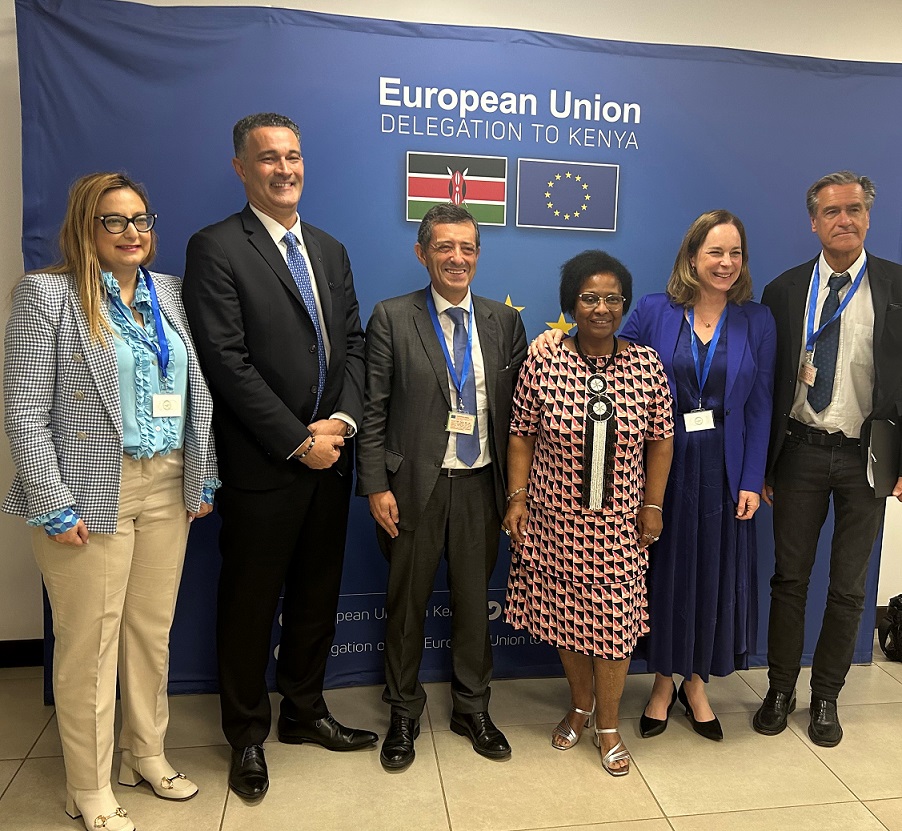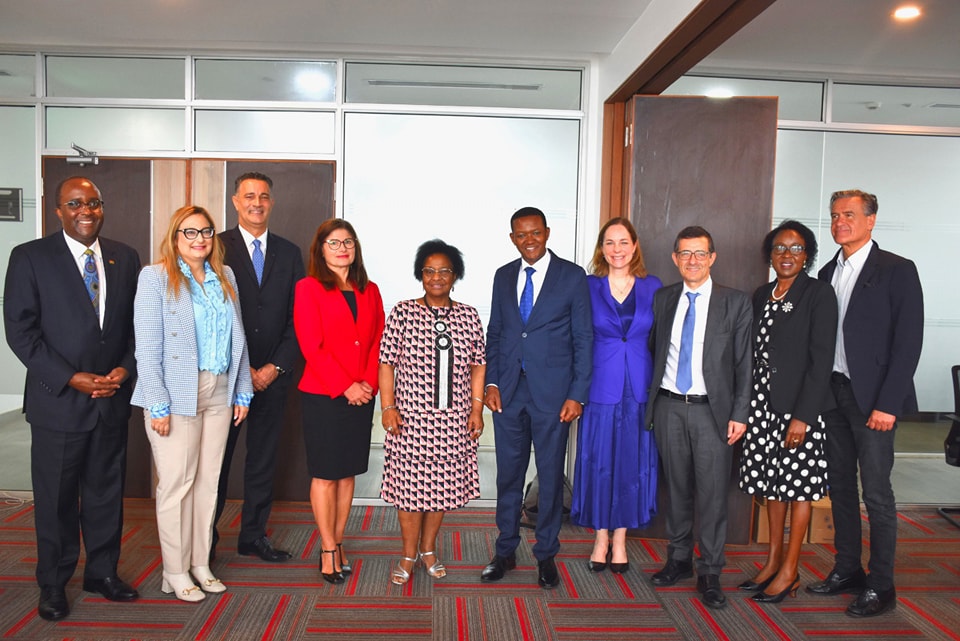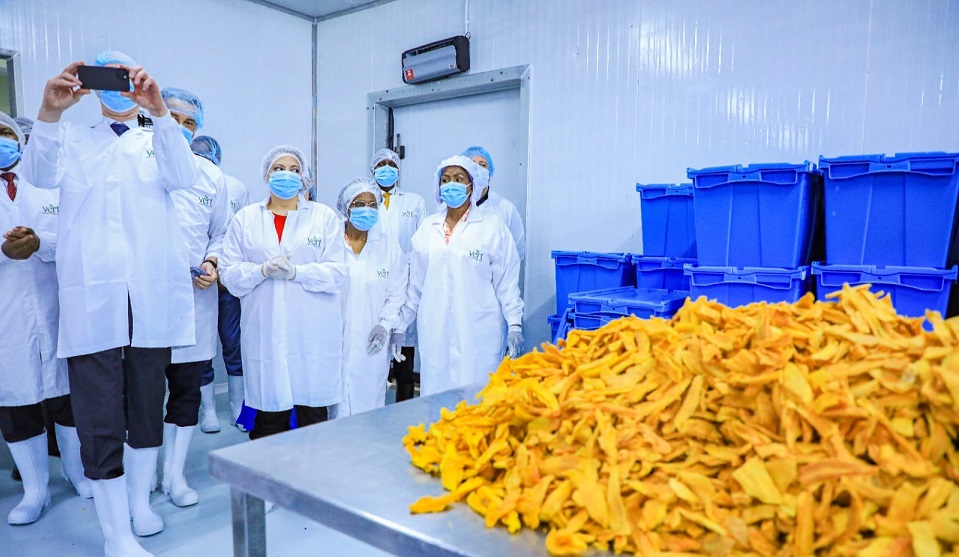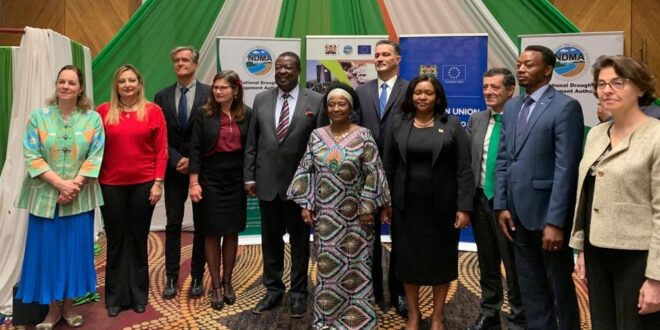Six members of the European Parliament’s Development Committee (DEVE) visited Kenya recently to consult with Kenyan government, civil society and business community on the impact of the humanitarian crisis caused by the cumulative effect of climate change, drought, food insecurity and its corollary famine, on the country’s economy. Dr Pierrette Herzberger-Fofana MEP, head of the delegation, writes on what the trip achieved
As 1st Vice-President of the Commission (Greens/EFA, Germany), I had the honour to lead the DEVE’s mission to Kenya. It took place from 3 to 6 April 2023.
Our mission had the following objectives:
1 – To analyse the response of the European Union to the dramatic drought in this country.
2 – To assess the EU’s programmes to support the agricultural sector, preserve the environment and combat climate change.
3 – We also wanted to understand the future role of the European Investment Bank (EIB) in the implementation of the Global Gateway.

Members of the Delegation. From left: Dr Eleni Stavrou (EPP. Cyprus), Stéphane Bijoux (Renew. Liberals, France), Dr Carlos Zorrinho, President of the ACP-EU Joint Parliamentary Assembly (Africa, Caribbean and Pacific, S&D, Socialist Party, Portugal), Dr Pierrette Herzberger-Fofana (Green Party, Germany), Hildegard Bentele (EPP, Germany) Dr Juan Fernando Lopez Aguilar (S&D, Spain)/Photo: PHF
During these three days, we had intense and fruitful discussions with members of government, parliament, civil society, UN organisations, women’s associations, investors and business leaders.
Our discussions focused on some of the challenges to achieving the Sustainable Development Goals, including education, poverty eradication and climate change.
We also discussed the situation in refugee camps, the situation of women and young people and job creation.
Climate change has greatly affected biodiversity and paved the way for famine. Indeed, for the past 5 years, a dramatic drought has been raging in the northern part of the country. It is destroying all the efforts made in the field of agriculture. The rest of the country is plagued by floods.
Our first visit was to the Ministry of Foreign Affairs in the company of the EU Ambassador, HE Henriette Geiger. The Minister of Foreign Affairs and Diaspora, Dr Alfred Mutua, spoke about the financial contribution of the EU as well as that of the Diaspora, the recent political crisis in the country following the presidential elections, and Kenya’s role as a mediator in East Africa.

The delegation members with the Foreign and Diaspora Affairs Minister, Dr Alfred Mutua (5th from right) and two of his ministry’s officials /Photo: Alfred Mutua/Facebook
Ms Winnie Odinga, MP and daughter of the Leader of the Opposition, highlighted the creation of the new East African regional parliamentary assembly which aims to manage conflicts in order to stabilise the region.
The highlight of our visit was the launch of the project to eradicate the effects of drought. This scourge has caused a great loss of life. The lack of water has partly destroyed the wildlife. Over 200 elephants and other animals have died.
The talks at the Kenyan parliament focused on drought, climate change and the political situation in the country. The members of the Young MPs Association focused on the specific problems of youth, namely education, digitalisation and high unemployment, coupled with a new form of immigration: climate refugees. They criticised Europe’s policy of closing the door to immigration. Indeed, Kenya is one of the most vulnerable countries that is suffering from the effects of climate change.
During our mission, we saw that, despite the enormous challenges it faces, Kenya is an innovative country. It has a young population. Indeed, 70% of the population is under 35 years old. It is also a world leader in the use of renewable energy: solar, hydro, wind and geothermal. Kenyan society is characterised by a strong use of digital technology, particularly in urban areas.

The delegation during a visit to the Kenya Mangos Factory in Machakos/Photo: Governor Press Service – Machakos County
European investment is vital. The European Union remains one of the main donors. Together with the Governor of Machakos, Hon. Wavinya Ndeti Oduwole, we visited a mango factory funded by the EU and the European Investment Bank. This factory provides income for local farmers. It is located in Machakos, a town about 60 km from Nairobi. It employs a large majority of women. The processing plant specialises in exporting dried mangoes to Europe. We were able to see how the employees work and appreciate the quality of this project.
The members of the Committee on Development renewed their intention to continue to cooperate with Kenya in a spirit of mutual trust, partnership and respect. Therefore, as head of the delegation, I made the following statement:
“We have seen with our own eyes how EU humanitarian and development funds are supporting Kenya’s efforts to combat the effects of severe drought and climate change. Addressing its far-reaching consequences is essential to improve gender equality, access to education, sustainable development and better resource management.”
Dr Carlos Zorrinho, (Portugal, S&D), Co-President of the ACP Joint Parliamentary Assembly, said:
“We have a lot to learn from each other, and Africa is our partner of choice given our close geographical and strategic links. We can offer a value-based partnership in line with the post-Cotonou Agreement, which we look forward to signing”.
Our mission ended with the screening of a film on female genital mutilation “#FrontLine Ending FGM” funded by the European Union. Survivors of a persistent tradition in Kenya gave moving testimonies of this custom that still exists. We will screen this film at the European Parliament during our next event on female genital mutilation.
Our mission showed us how climate change is taking its toll on the country. With the launch of the project “Climate Action in Drylands for Community Resilience to Drought” we want to help reduce the effects of the drought in Kenya. We would like to thank our Kenyan partners, the EU ambassador and all the various organisations we met, for the warm welcome we received.
——
Dr. Pierrette Herzberger-Fofana, a Member of the European Parliament representing Germany on the platform of the Green Party, is also:
– 1st Vice-President of the committee on Development DEVE
– Vice-President for Relations with the Pan-African Parliament DPAP
– Vice-President Delegation to the ACP-EU Joint Parliamentary Assembly DACP
READ ALSO A tree for future generations in Kenya by Dr Pierrette Herzberger-Fofana MEP
 THE AFRICAN COURIER. Reporting Africa and its Diaspora! The African Courier is an international magazine published in Germany to report on Africa and the Diaspora African experience. The first issue of the bimonthly magazine appeared on the newsstands on 15 February 1998. The African Courier is a communication forum for European-African political, economic and cultural exchanges, and a voice for Africa in Europe.
THE AFRICAN COURIER. Reporting Africa and its Diaspora! The African Courier is an international magazine published in Germany to report on Africa and the Diaspora African experience. The first issue of the bimonthly magazine appeared on the newsstands on 15 February 1998. The African Courier is a communication forum for European-African political, economic and cultural exchanges, and a voice for Africa in Europe.

































